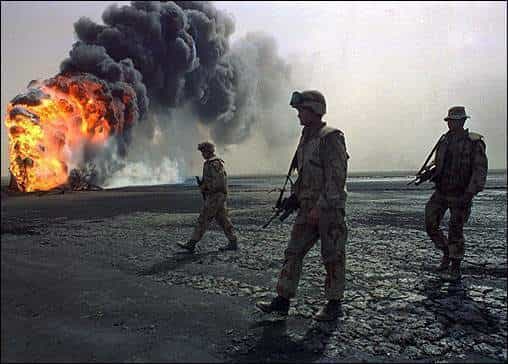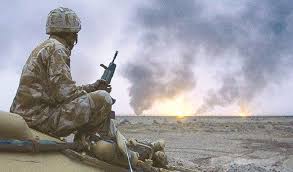Between 1990 and 1991, the United States and an international coalition of 34 countries fought Iraq in what became known as the Gulf War. The reason for the conflagration was the invasion of Kuwait by Iraqi troops.
On August 2, 1990, the Iraqi army stormed the territory of Kuwait and annexed the small emirate located in the Persian Gulf.
That invasion triggered a strong international response and the UN Security Council condemned the invasion.
After a series of sanctions were approved, the United States began sending troops to Saudi Arabia, leading a powerful coalition with the aim of liberating Kuwait and enforcing international law.
Following an aerial bombardment campaign over Iraq and rapid ground intervention, the Iraqi regime surrendered and agreed to withdraw from Kuwait.
Origin of the Gulf War
After a long war of attrition with Iran, Iraq’s economy was in dire straits. By 1990, the country had an external debt that exceeded 70,000 million dollars.
Thus, Iraq was trying to increase its oil production figures, all this to be able to face the large external debt that it maintained.
On the other hand, political tensions with Kuwait were growing. Iraq argued that the Kuwaitis had usurped oil from its Rumaila oil fields.
Also in relation to crude oil, the regime headed by Saddam Hussein claimed that Kuwait was not respecting the OPEC oil extraction agreements.
In this sense, Iraq maintained that Kuwait was extracting more oil than agreed. Thus, the increase in oil production by Kuwait was driving down oil prices and clearly hurting Iraq. And it is that, 95% of Iraqi exports were due to oil.
Iraq also demanded that Kuwait forgive its loans, as they had fought the Iranians on behalf of all Arabs. Similarly, Iraq claimed the island of Bubiyan, close to the port town of Um Qasr. In this way, Iraq would have a better outlet to the sea.
Iraq and Kuwait entered into talks, but diplomacy failed, and eventually Saddam Hussein decided to invade Kuwait.

The invasion of Kuwait and its consequences
On August 2, 1990, Iraqi infantry and combat vehicles crossed the border and invaded the small emirate of Kuwait. Quickly, Iraqi forces seized control of the country and Emir Jaber Al-Sabah fled Kuwait.
The Iraqi invasion of Kuwait received strong international condemnation.
In the face of a flagrant violation of international law, economic sanctions were imposed on Iraq, which not long after would be reinforced by an embargo. In response to the Iraqi aggression, a coalition of 34 countries led by the United States was forged.
For its part, Saudi Arabia made its territory available as a starting point for an eventual invasion of Iraq. Meanwhile, the United States and the United Kingdom were deploying troops to the region, preparing to engage the Iraqi army.
Fighting the Iraqi forces was presented as a major military challenge. Operation Desert Shield involved deploying hundreds of thousands of men to defeat the Iraqi army, considered the fourth largest fighting force in the world.
Precisely, this deployment was intended to protect Saudi Arabia from possible Iraqi attacks.
Operation Desert Storm
On January 16, 1991, the coalition offensive began, called Operation Desert Storm.
The multinational force launched bombardments from the air and from the sea, destroying military targets, infrastructure and industries.
From then on, the images of CNN remain on the retina of many Americans, broadcasting the war live.
Subsequently, on February 24, 1991, the ground intervention took place. The coalition offensive was overwhelming for Iraqi troops, who surrendered en masse.
Kuwait was reconquered and, after about four days of fighting on the ground, Iraq surrendered and abided by UN conditions, which implied respecting Kuwait’s sovereignty.
Consequences of the Gulf War
With its victory in the Gulf War, the United States increased its presence in the Middle East. Iraq promised to dismantle its arsenal and to respect the territorial integrity of Kuwait.
Another disastrous consequence for the environment was the sabotage of the oil wells. When the oil did not burn causing huge plumes of black smoke, it remained stagnant on the ground, polluting the surface of the desert.
Economic aspects
The Gulf War was an economically disastrous event for Third World countries. Rising oil prices meant that countries like Bangladesh, the Philippines and Pakistan had to pay $ 5 billion more than in 1989 to buy oil.
If there is a country that suffered particularly severely from the economic consequences of the Gulf War, it was Jordan.
In this sense, the Jordanians showed a strong dependence on Iraqi oil, they saw how their industry was only operating at 10% of its total capacity.
At the macroeconomic level, the 2,000 million dollars that this crisis cost Jordan, which came to represent more than 25% of the country’s Gross National Product (GNP) .
Jordan’s economic hardships transcended economic figures and its pro-Iraq stance cost it to run out of economic aid from its Arab neighbors.
In the United States, the war seemed to give the economy some boost. The military victory in the Persian Gulf caused oil prices to plummet and interest rates also fell, with a positive impact on real estate .
Countries like Kuwait and Saudi Arabia increased oil production, driving the price down and, at the same time, paying the cost of the war.
In fact, the conflict consolidated Saudi Arabia as the great leader of OPEC, while, with a defeated Saddam Hussein, Iraq saw its power of control over the oil supply reduced.






